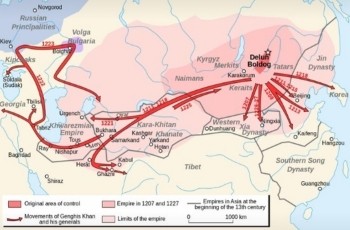シンクタンクからの眼 2024年8月18日
モンゴルから見る世界史-もしもモンゴル軍がヨーロッパをさらに深く征服していたら?

今回は『賢者コラム Wisdom Columns』として、アジア北方史研究の巨匠として知られる黄有福先生の寄稿文をご紹介いたします。
モンゴルから見る世界史 - もしもモンゴル軍がヨーロッパをさらに深く征服していたら?
歴史とは「もしも」という仮定を許さないものだと言われるが、時には「もしも~だったら?」という問いが、過去をより深く理解する手がかりを与えてくれることもある。ということで、もしも、13世紀のモンゴル軍が東ヨーロッパを超えて西ヨーロッパまで進出していたら、今日の世界の姿はどのように変わっていただろうか?
モンゴルの大遠征と東ヨーロッパの征服
モンゴル帝国は13世紀初頭、チンギス・ハンの軍事的才能と徹底した戦略をもとに、急速に領土を拡大した。金王朝(12~13世紀前葉まで満洲と中国北半を支配した女真族王朝)を征服した後、モンゴルは中央アジアを超えて西へと目を向けた。モンゴル軍は、1220年代にはホラズム・シャー朝を滅ぼした後、ロシア地域のほとんどを制圧した。
その後、チンギス・ハンの後継者であるオゴデイ・ハンは西方遠征を本格化させた。1236年から1242年にかけて、チンギス・ハンの孫であるバトゥが率いるモンゴル軍は、ロシアの諸公国を次々と征服し、ハンガリー平原まで進軍した。1241年、バトゥはハンガリー国王ベーラ4世の軍をティサ川の戦いで撃破し、ポーランドではシレジア公ハインリヒ2世をリーグニッツの戦いで破った。当時のヨーロッパはモンゴル軍の侵攻に対して全く無力であり、モンゴル軍がオーストリア、ドイツ、イタリアまで進軍するのは時間の問題だと思われた。
しかし1242年、オゴデイ・ハンが死去したため、モンゴルのヨーロッパ征服は中断された。バトゥはモンゴル帝国の後継者を決定するクリルタイ(評議会)に参加するために撤退し、これによりヨーロッパはモンゴルの支配を免れることができた。
もしもモンゴルのヨーロッパ征服が続いていたら?
もしもバトゥが撤退せずに進軍を続けていたならば、モンゴル軍はウィーンやプラハを経てドイツやフランスまで圧迫した可能性が高い。当時のヨーロッパの防衛力では、モンゴル軍を食い止めるのは困難だっただろう。モンゴル軍は優れた機動力と組織的な戦略で、強固なヨーロッパの城塞を無力化したはずだ。
モンゴルが西ヨーロッパまで征服していたならば、ユーラシア大陸全体が一つの巨大な帝国として統合されていた可能性がある。これは4世紀のフン族の侵攻以来、東西が再び一つに結びつく歴史的大事件となったかもしれない。
当時、モンゴルはすでにイスラム商人とヨーロッパのキリスト教勢力を巻き込む交易ネットワークを築いており、文化的にも東西文明を融合させる政策を推進していた。そのため、西ヨーロッパまで征服していたならば、ヨーロッパの言語、宗教、文化、人種構成まで変化していた可能性がある。
また、キリスト教中心のヨーロッパ秩序が変化し、イスラム教や仏教、シャーマニズムが融合した新たな文化が形成されていたかもしれない。現在のヨーロッパがキリスト教文明だけでなく、多様な宗教と文化の中心地になっていた可能性もある。
もしもモンゴル軍がヨーロッパを西の最後まで征服していたなら?
モンゴル軍がヨーロッパ全土を征服していたならば、ヨーロッパの宗教や文化、人種構成に当然ながら大きな変化が生じていた可能性が高い。
上述のように、先ずはキリスト教世界の変化として、カトリック中心のヨーロッパのキリスト教文化は現在とは異なる形に発展していただろう。モンゴルの宗教的寛容政策により、ヨーロッパ内部の宗教的多様性が拡大していた可能性がある。
そして、ユーラシア全体において東西文明の融合がなされて、東アジアとヨーロッパ間の文化的・経済的交流がさらに活発になっていたはずだ。アラブや中国地域の文明や技術がヨーロッパに早く伝わり、ルネサンスがより早期に到来した可能性もある。
なお、モンゴルの継続的な征服と定住によりヨーロッパの人種構成の変化が続き、ヨーロッパでアジア系の血統がさらに混ざっていた可能性が高い。この場合、ヨーロッパの言語、芸術、建築などの分野でもアジア的要素がより強く根付いていたかもしれない。
事実上のモンゴル帝国の分裂とヨーロッパの歴史
歴史では、モンゴル帝国は13世紀後半から内部対立が深まり、最終的に4つのハン国(汗国)に分裂した。キプチャク・ハン国(ロシア支配)、チャガタイ・ハン国(中央アジア)、オゴデイ・ハン国(西モンゴル)、そして元朝(中国)に分かれたモンゴルは次第に衰退していった。これにより、ヨーロッパはモンゴルの支配から解放され、ルネサンスや近代化へと進むことができた。
もしもモンゴルがヨーロッパを持続的に支配していたならば、産業革命や大航海時代も現在とは異なる形で展開されていただろう。ヨーロッパがアジアと同じ政治・経済体制を維持していたならば、今日の西洋中心の世界秩序は存在しなかったかもしれない。
モンゴルのヨーロッパ侵攻が残した教訓
ある意味では、モンゴルは単なる略奪者ではなく、東西の経済交流を促進した世界的な交易帝国でもあった。モンゴル帝国の拡張はシルクロードを活性化し、アジアとヨーロッパの交流を促進した。モンゴルがヨーロッパ全土を征服することはなかったが、モンゴルの進出はヨーロッパ世界にも大きな衝撃を与え、ヨーロッパ諸国が中央集権的な軍事システムを発展させる契機となった。
「もしも」という仮定を通じて、私たちは歴史の流れを新たな視点で捉えることができる。もしもモンゴルがヨーロッパまで征服していたならば、世界は今日とは全く異なる姿になっていたかもしれない。
しかし、結局のところ、歴史は流れの中で展開されるものだ。
モンゴル帝国の征服が東ヨーロッパで止まったからこそ、現在のヨーロッパとアジアの文化的な違いが存在しているのではないだろうか?
(黄 有福、中国中央民族大学名誉教授・元ハーバード大学招聘教授)
『Wisdom Columns』World History from the Perspective of Mongolia—What If the Mongol Army Had Conquered Deeper into Europe?
It is often said that history does not allow for "what if" scenarios. However, at times, asking "What if?" can provide deeper insights into the past. So, what would the world look like today if the Mongol army of the 13th century had advanced beyond Eastern Europe and into Western Europe?
The Mongol Expansion and the Conquest of Eastern Europe
In the early 13th century, the Mongol Empire rapidly expanded under the military genius and strategic leadership of Genghis Khan. After conquering the Jin Dynasty (which ruled Manchuria and northern China from the 12th to the early 13th century), the Mongols turned westward beyond Central Asia. By the 1220s, they had destroyed the Khwarazmian Empire and gained control over most of the Russian territories.
Genghis Khan's successor, Ögedei Khan, intensified the westward expansion. Between 1236 and 1242, a Mongol army led by Batu Khan, the grandson of Genghis Khan, systematically conquered the Russian principalities and advanced into the Hungarian plains. In 1241, Batu defeated King Béla IV of Hungary at the Battle of the Sajó River, and in Poland, Duke Henry II of Silesia was crushed at the Battle of Legnica. At that time, Europe was completely defenseless against the Mongol invasion, and it seemed only a matter of time before the Mongols would march into Austria, Germany, and Italy.
However, in 1242, Ögedei Khan died, halting the Mongol conquest of Europe. Batu Khan withdrew his forces to participate in the kurultai (council) to decide the next ruler of the Mongol Empire, allowing Europe to escape Mongol rule.
What If the Mongol Conquest of Europe Had Continued?
Had Batu Khan continued his advance instead of retreating, the Mongol army would likely have pressed through Vienna and Prague into Germany and France. Given the defensive capabilities of medieval Europe at the time, it would have been extremely difficult to stop the Mongol forces. The Mongols, with their superior mobility and highly organized military strategies, would have neutralized even the most fortified European strongholds.
If the Mongols had conquered Western Europe, the entire Eurasian continent might have been unified under a single vast empire. This could have been a historic event similar to the invasions of the Huns in the 4th century, once again linking East and West under a single power.
By this time, the Mongols had already established a trade network connecting Islamic merchants and Christian Europe and were pursuing policies to fuse Eastern and Western civilizations. If they had conquered Western Europe, it is possible that European languages, religions, cultures, and even racial compositions would have changed significantly.
Additionally, the Christian-dominated European order could have shifted, leading to a new cultural synthesis incorporating elements of Islam, Buddhism, and Shamanism. Modern Europe might have become not only a Christian civilization but also a center of diverse religious and cultural traditions.
What If the Mongol Army Had Conquered the Entirety of Europe?
Had the Mongols successfully conquered all of Europe, it is highly likely that European religion, culture, and racial demographics would have undergone significant transformations.
First, the Christian world would have evolved differently. The Catholic-dominated European religious culture might have developed in a very different form. The Mongols, known for their religious tolerance, could have fostered greater religious diversity within Europe.
Furthermore, a full-scale fusion of Eastern and Western civilizations might have occurred, accelerating economic and cultural exchanges between East Asia and Europe. Advanced technologies and intellectual traditions from the Arab and Chinese worlds might have reached Europe earlier, potentially accelerating the onset of the Renaissance.
The continued Mongol occupation and settlement could have led to long-term demographic shifts, with more intermingling between Asian and European populations. This could have resulted in stronger Asian influences in European languages, art, architecture, and other cultural aspects.
The Inevitable Division of the Mongol Empire and European History
Historically, the Mongol Empire began to fracture due to internal conflicts in the late 13th century, eventually splitting into four major khanates: The Golden Horde (which ruled Russia), The Chagatai Khanate (which controlled Central Asia), The Ögedeid Khanate (which governed western Mongolia), The Yuan Dynasty (which ruled China under Kublai Khan). As these divisions deepened, the Mongols gradually lost control, allowing Europe to break free from Mongol influence and progress towards the Renaissance and modernization.
Had the Mongols continued to dominate Europe, the Industrial Revolution and the Age of Exploration might have unfolded in a completely different manner. If Europe had maintained the same political and economic structures as Asia, the modern Western-dominated world order might never have emerged.
Lessons from the Mongol Invasion of Europe
In a way, the Mongols were not merely raiders but also a global economic empire that facilitated East-West trade. Their expansion revitalized the Silk Road and promoted exchanges between Asia and Europe. Although they never fully conquered Europe, their incursions left a significant impact, forcing European states to develop centralized military systems in response.
By considering "what if" scenarios, we can view historical developments from new perspectives. If the Mongols had conquered all of Europe, the world today could be vastly different.
However, in the end, history unfolds as it does, shaped by its own unique currents.
Perhaps the reason Europe and Asia remain distinct in cultural and historical identity today is precisely because the Mongol Empire's conquest stopped where it did.
(Namhoson Youfu Hwang, Professor Emeritus at Minzu University of China; Former Visiting Professor at Harvard University)




